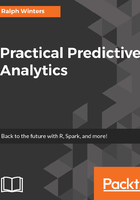
上QQ阅读APP看书,第一时间看更新
Related job skills and terms
Along with the term predictive analytics, here are some terms that are very much related:
- Predictive modeling: This specifically means using a mathematical/statistical model to predict the likelihood of a dependent or target variable. You may still be able to predict; however, if there is no underlying model, it is not a predictive model.
- Artificial intelligence (AI): A broader term for how machines are able to rationalize and solve problems. AI's early days were rooted in neural networks.
- Machine learning: A subset of AI. Specifically deals with how a machine learns automatically from data, usually to try to replicate human decision-making or to best it. At this point, everyone knows about Watson, who beat two human opponents in Jeopardy.
- Data science: Data science encompasses predictive analytics but also adds algorithmic development via coding, and good presentation skills via visualization.
- Data engineering: Data engineering concentrates on data extraction and data preparation processes, which allow raw data to be transformed into a form suitable for analytics. A knowledge of system architecture is important. The data engineer will typically produce the data to be used by the predictive analysts (or data scientists).
- Data analyst/business analyst/domain expert: This is an umbrella term for someone who is well versed in the way the business at hand works, and is an invaluable person to learn from in terms of what may have meaning, and what may not.
- Statistics: The classical form of inference, typically done via hypothesis testing. Statistics also forms the basis for the probability distributions used in machine learning, and is closely tied with predictive analytics and data science.